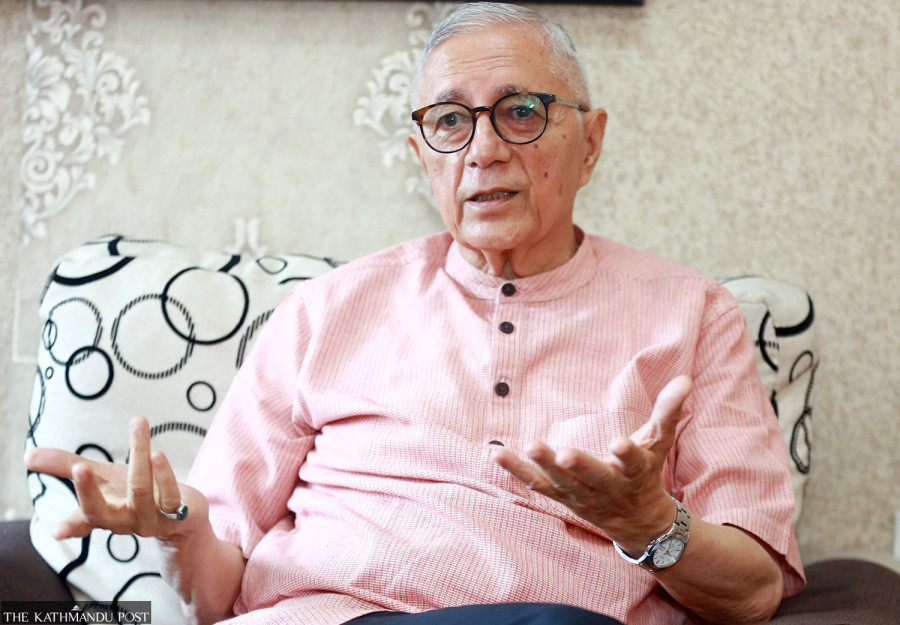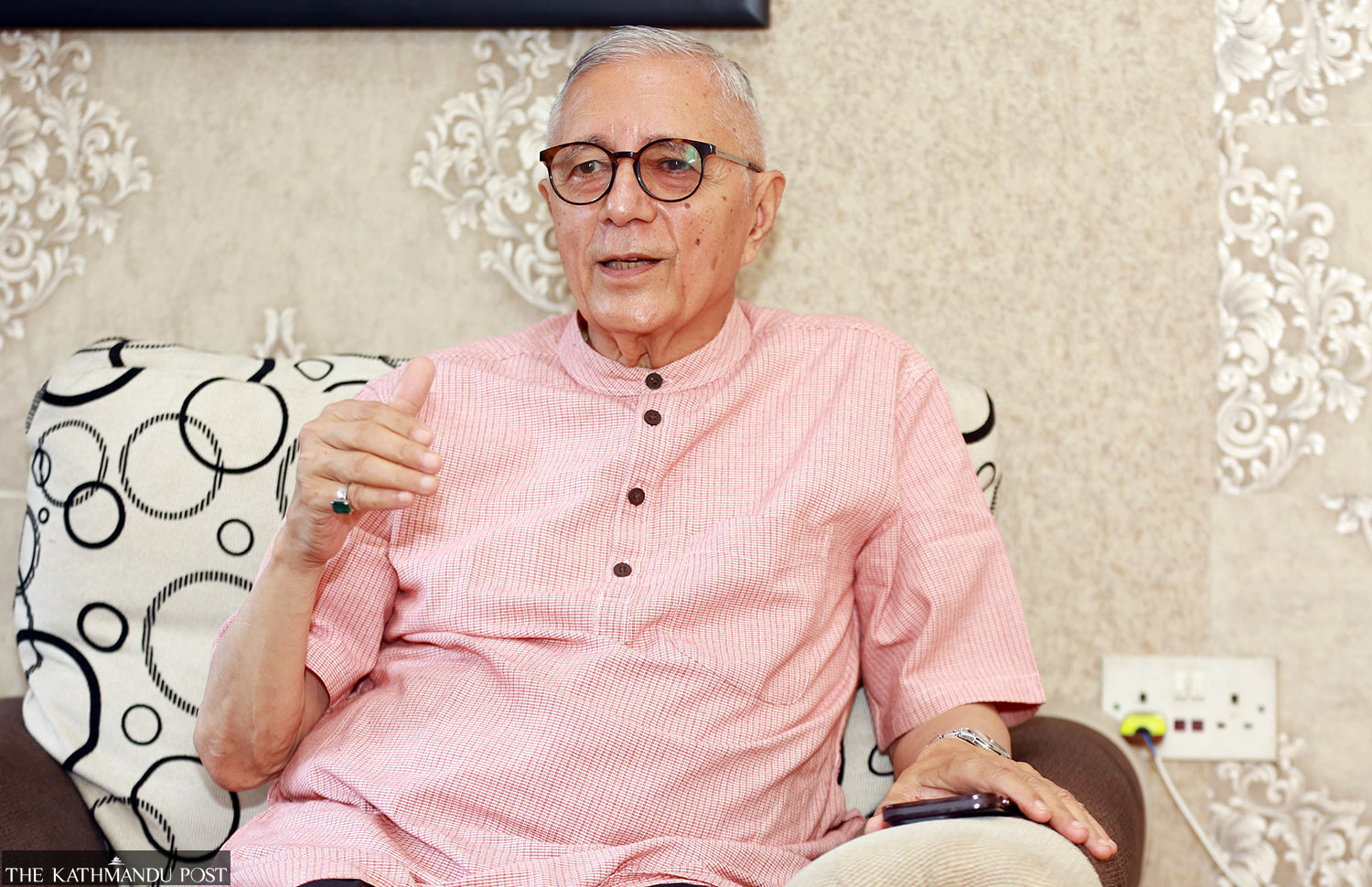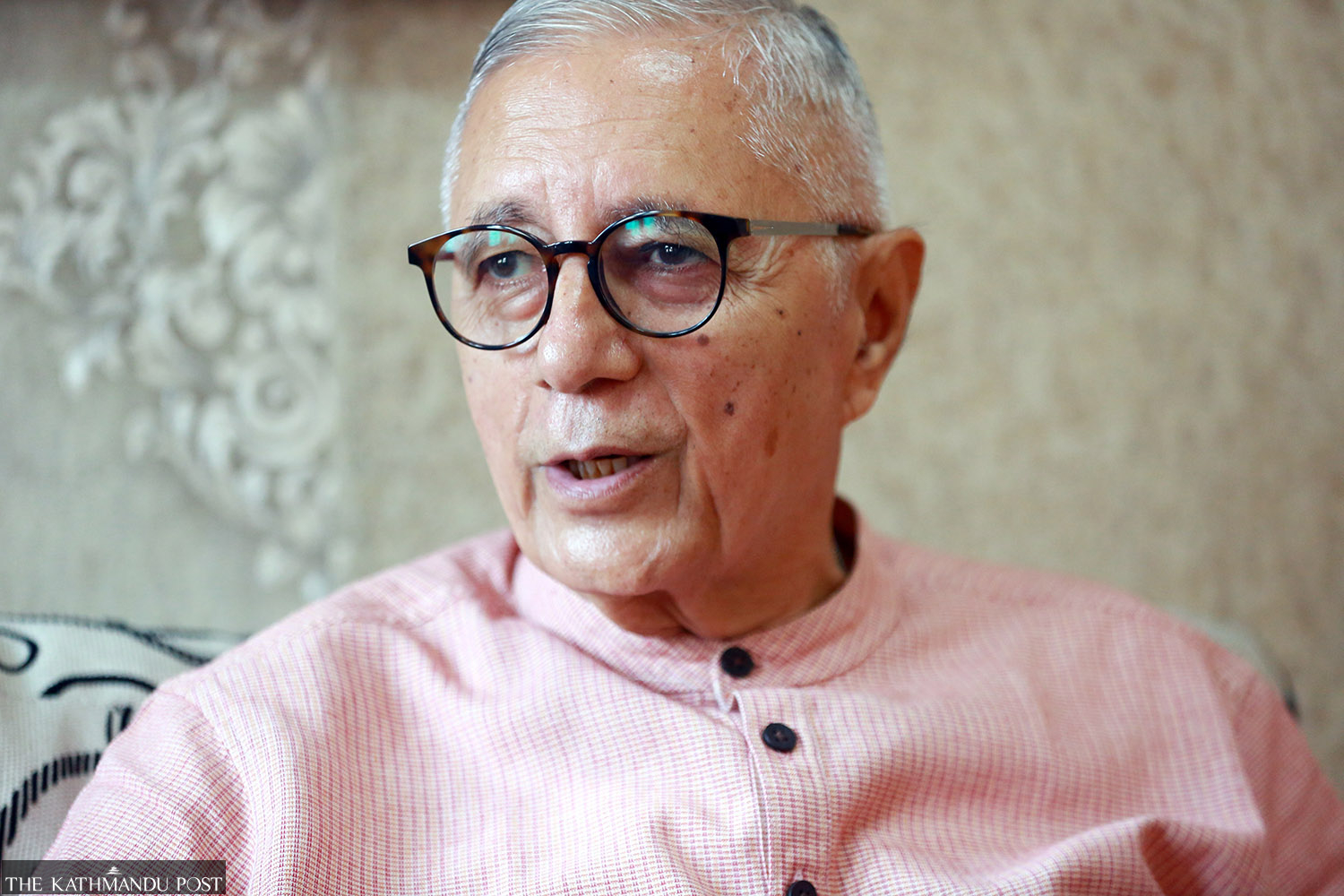Interviews
Goal of disciplinary action seems to be to eliminate one Congress faction
Concerns over an alliance between two dominant parties steering the country on an authoritarian course have been heightened.
Anil Giri & Purushottam Poudel
In this wide-ranging interview, senior Nepali Congress leader Shekhar Koirala speaks to the Post’s Anil Giri and Purushottam Poudel on one year of the current government, rifts in the party, and controversial disciplinary actions against party members. As a contender for party presidency, Koirala also outlines his vision for the country’s development, touching on clean energy, agriculture, and religious tourism.
You were the one who initially proposed the Nepali Congress and the CPN-UML to form a coalition government. But no sooner was the government formed, you became its vocal critic. Now that the government has completed a year, how do you assess this government?
A year ago, I held several rounds of discussions with CPN-UML Chairman KP Sharma Oli, proposing the formation of a Congress-UML coalition government. The seven-point understanding that later became the foundation of this government was also discussed in those earlier talks.
However, when I was engaged in discussions, the understanding was that the Congress would lead the government. But what happened was that the government was formed under UML’s leadership—a significant shift from the original idea.
There were concerns at the time about whether such an alliance between two dominant parties might steer the country towards a more authoritarian direction—concerns that seem to have heighted now. Consider the controversial bills we’ve lately seen: the land-related bill, the proposed social media legislation, and the provision allowing two members of the Constitutional Council to make decisions independently. These are precisely the outcomes I feared when I was first advocating for a coalition.
Still, my proposal had a clear historical basis. When Krishna Prasad Bhattarai was Prime Minister, the UML was part of the coalition, and that government delivered the 1990 Constitution within a year. Again in 1996, Girija Prasad Koirala led a Congress government with UML as a partner, and that government successfully conducted elections. In 2014, Sushil Koirala’s government, backed by UML, gave the country a new constitution.
In all three cases, the government was led by the Congress. I had proposed a coalition with the UML in this context, and Oli had also shown willingness. This government had failed to live by the promises with which it was formed.
The coalition government was formed following an understanding between Sher Bahadur Deuba and UML Chairman KP Sharma Oli. Opposition parties have alleged that part of the reason this government came into being was to shield the current foreign minister, Arzu Rana Deuba, from possible prosecution in the Bhutanese refugee scam. Do you agree?
We cannot definitively claim this was the case. However, if one assesses the political climate and circumstances at the time, the allegation cannot be ruled out. Some people also believe Rabi Lamichhane, President of the Rastriya Swatantra Party and former Home Minister, is in pre-trial detention because of that same background. While I would not say the Congress supported a UML-led government solely for that reason, I also cannot say with full confidence that the issue played no role whatsoever.

What do you make of the disciplinary actions in the party, supposedly over ‘betrayal’ during the last general elections? How did this issue gain traction nearly two and a half years after the election?
The Nepali Congress has a disciplinary committee, and according to the party statute, it is required to act upon any complaint within six months. This committee was formed by the party president and has five members. In the present structure, three of the committee members are aligned with the president. The disciplinary committee recently took action against a few party leaders. We have expressed concern over the committee’s failure to include dissenting views in the official documentation.
In this case, it appears that disciplinary action was taken against certain party members, with only one faction of the committee involved in the decision-making process. There were no broader consultations with other party leaders, and even within the committee, two members seem to have been excluded from the process.
For those who are now defending the disciplinary actions, have all our leaders fully complied with party discipline during the last election? Let me reiterate that I am not saying all the individuals penalised were completely clean. They may indeed have made mistakes, and if so, they should face consequences. However, a disciplinary committee is meant to function like a judicial body—impartial and balanced. Before proposing such serious actions, it should have assessed the situation in totality.
Historically, intra-party betrayal during elections has been acknowledged as a key issue within the Congress. So why object to disciplinary action now?
The problem lies in the biased and selective nature of the action. Moreover, the timing is questionable. We are approaching a by-election in Rupandehi-3, and the former general secretary from that district has been targeted. Additionally, the general election of 2027 is also approaching. At this sensitive time, the party has suspended several members for a full year under disciplinary charges.
How can the party present itself strongly in upcoming elections when it takes severe action against its members, especially as it faces electoral challenges from parties like the Rastriya Swatantra Party and the Rastriya Prajatantra Party? These actions could weaken the party further.
Hence, we must act wisely. Disciplinary measures could have been taken, but short-term penalties and warnings are enough to make individuals aware of their actions. Issuing year-long suspensions does not help create a positive or constructive atmosphere within the party.
In this context, you recently raised the issue of party lawmaker and industrialist Binod Chaudhary during a meeting of the Central Working Committee. Why did this matter arise now, and why raise questions about him?
In the Central Committee meeting, I mentioned that disciplinary decisions must be made in a larger context. If we treat individual claims as facts, the intent seems to be to eliminate one faction within the party. Some colleagues questioned why I explicitly mentioned Binod Chaudhary.
During the party’s 9th General Convention in Pokhara, the then Party President Girija Prasad Koirala declined to grant central committee membership to his daughter, Sujata Koirala, because she had not been actively involved in the party for the required 10 years. At the time, she had only been active for approximately eight and a half years.
By contrast, Chaudhary became a central committee member despite not meeting that requirement. Further, the individual from Nawalparasi West-1—the constituency represented by Chaudhary—who has now faced disciplinary action, has been active in the party for long. He was elected to the Constituent Assembly as a Congress representative, while Chaudhary, in that period, was a Constituent Assembly member under the UML quota.
When the party gave Chaudhary the election ticket in a constituency where the other candidate had long-standing political involvement, there was bound to be resentment. It’s natural that he may have expressed frustration. But let’s not forget that there was reconciliation between them prior to the election, and Chaudhary went on to win. So why was disciplinary action still taken?
But it’s neither election season nor campaign time, why raise the issue of Chaudhary now?
This is not a new concern. The matter was first brought up during the party’s 14th General Convention in December 2021. At the time, questions were raised over the party’s rule that no one should contest for central committee membership without being actively involved in the party for at least 10 years. This issue has a history.
In fact, Santosh Kumar Yadav—son of the party’s former treasurer Sitadevi Yadav—filed a case against Chaudhary at the Supreme Court precisely on these grounds. That case remains active to this day.
Let me be clear—I am not personally against Chaudhary. The issue here is about respecting the party’s rules and procedures. At present, Chaudhary is reportedly unable to even visit his constituency, and political activity in the district has come to a standstill. All the elected members of the district party committee openly oppose him.
Those leaders facing disciplinary action still have the opportunity to defend themselves, and the action cannot be implemented without approval from the Central Committee. So why is this matter such a major issue?
Yes, those who have been subjected to disciplinary action still have the right to present their defence within 35 days. They also have the legal option of taking the matter to court, and we will accept whatever verdict the court delivers. However, we also know how the courts operate in this country.
This is not simply about the individuals who were punished—it is about the integrity of the process. The role of the party president is also now in focus. How will he respond?
Perhaps only around 30 percent of the Central Committee members are on our side, so the party president would have the major say. But if the disciplinary action is granted legitimacy by the Central Committee, we must consider where that will take the party.
Let us turn to the Central Committee meeting. A recent meeting raised a number of important issues, including the reluctance of members to renew active party membership. Given this, how do you assess the overall standing of the party in the national political context?
We have already formed around 60 departments within the party, and many of these are very active. However, I have not seen that same level of activity in the party as a whole. Due to growing disillusionment, the renewal of active party membership has stagnated. No one seems to know when the next General Convention of the Congress will take place. During the most recent Central Committee meeting, several colleagues strongly urged the leadership to announce the date of the 15th General Convention.
Yet, the party president and senior office bearers could not or chose not to declare a date. If we look at the party’s history, the number of renewed active memberships has increased significantly after the announcement of a General Convention. There are rumours that the president intends to hold the convention only after the 2027 general elections. Others claim it will be completed by December 2026.
But my position is clear: the General Convention must be held by December of this year. The key issue is whether we have attracted new members to the party. Being an old and somewhat conservative institution, the Congress may not have attracted many new members in today’s age of populism, and that is a concern.
We need to consider how we can engage new members and bring them into the party’s fold. At present, the party lacks a clear mechanism for lateral entry, and structural barriers act as stumbling blocks for fresh talent. If elections were held under current conditions, I cannot confidently predict the party’s performance. It may not be disastrous, but it certainly won’t be promising either.

There is growing interest in how the power dynamics between you and Gagan Thapa might evolve in the lead-up to the next General Convention. Will the two of you move forward together?
There are no major ideological differences between us. Of course, there are differences in our functioning styles—and that’s to be expected, given the generational gap. But when it comes to the broader question of how the party should be run, I do not see any serious divergence. As for what happens in the future—who does what—that is something time will reveal.
Before the parliamentary party leader election in 2022, you and Thapa supposedly reached an agreement that you would support Thapa’s candidacy for parliamentary leader, and in return, he would support your candidacy for party president at the 15th General Convention. Was there such an agreement?
Yes, such an understanding was indeed reached at that time. Only Thapa can answer whether he stands by that agreement. As far as I’m concerned, I don’t believe there are any fundamental differences between us on vision or approach.
As a contender for party presidency, you are also a potential future candidate for prime minister. What is your vision for the country’s development?
If elected party president, my first priority would be to reduce—if not entirely eliminate—factionalism within the party. While it may not be possible to end it overnight, it is certainly possible to minimise it significantly.
Another key objective is to meaningfully connect the democratic socialism our party advocates with the people's everyday lives. We need to explore how the socialist ideals articulated by BP Koirala can be reinterpreted and implemented within today’s digital context.
To move in this direction, we must focus on four or five key areas.
While much attention is given to hydropower, I believe we must focus more on clean energy. I am not a technical expert, but I genuinely believe that Nepal holds great potential in solar energy. Likewise, there are significant opportunities in wind energy.
Second, our current model of agricultural development needs refinement. We must prioritise high-value cash crops. Coffee, tea, and medicinal herbs should be promoted, not only in terms of production but also in terms of industrial development in the country. It is unfortunate that while we speak so extensively about organic fertiliser, there is currently no legal framework governing it. Just a few days ago, some individuals affiliated with the UML approached me to express concern about the absence of legislation on organic fertiliser. Frankly, I was surprised—even I wasn’t aware of such a legal vacuum. While there is some production, lack of a legal foundation is a serious oversight.
This kind of inconsistency—grand statements without corresponding action—has left the public increasingly frustrated.
Last, and most importantly, we must recognise the enormous potential of tourism, particularly religious tourism. We also need to actively promote cultural tourism. For example, after the Indian Prime Minister’s visit to Muktinath, the tourism landscape of that area changed dramatically. That shows the kind of impact religious tourism can have, and we must leverage such opportunities strategically.




 16.12°C Kathmandu
16.12°C Kathmandu





.jpg&w=200&height=120)







